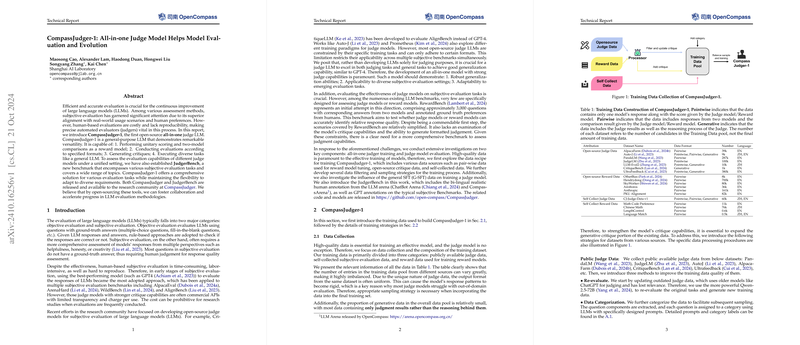Overview of CompassJudger-1: An Advanced Open-Source Judge Model
The evaluation of LLMs remains a significant challenge in the AI research community, particularly in effectively aligning model performance with human preferences. The paper outlines CompassJudger-1, an open-source LLM designed to address these evaluation challenges. This model serves as an all-encompassing judge capable of model scoring, comparative evaluation, critique generation, and diverse task execution. Furthermore, the paper introduces JudgerBench, a comprehensive benchmark for evaluating the effectiveness of different judge models in subjective scenarios.
Core Contributions
- All-in-One LLM Evaluation:
- CompassJudger-1 exemplifies a versatile LLM with robust judging capabilities. It performs functions traditionally associated with reward models, while also handling complex critique tasks.
- Comprehensive Benchmarking:
- JudgerBench offers a nuanced testing environment allowing for evaluating judge models across various dimensions, including alignment with human evaluations and critique proficiency.
Data Collection and Training
The paper underscores the importance of high-quality data for effective model training. Training data for CompassJudger-1 encompasses multiple sources:
- Public Judge Data: Utilized datasets like PandaLM and AlpineFarm, re-evaluated with capable models such as Qwen-2.5-72B to ensure relevance.
- Reward Data: Integrated in balanced proportions to bolster the model’s judgment capabilities while avoiding overfitting.
- Self-Collect Data: Includes subjective evaluations from iterative model development stages, highlighting a pragmatic approach to data expansion.
Through extensive data filtering, categorization, and sampling strategies, the authors ensure a balanced dataset that enhances both the generalization and specificity of CompassJudger-1.
Training and Ablation Studies
The training framework adopted (Xtuner) and the strategic balance of critique, reward, and general SFT data are investigated to optimize the model's performance:
- Optimal Data Ratios: Through ablation studies, the paper identifies optimal training data ratios (1:3:1 for critique:reward:sft), facilitating a judicious mix that augments both judging and generalization capacities.
- Impact of G-SFT Data: Incorporating general SFT data reinforces the model's universality, demonstrating that small amounts aid in maintaining performance across varied tasks.
Evaluation on JudgerBench
The evaluation against JudgerBench, comprising both Arena and Benchmark components, substantiates CompassJudger-1's capabilities:
- Alignment with Human Preferences: Tasks in JDB-A reflect high accuracy in mirroring human judgment.
- Critique and Format Adherence: In JDB-B, the model's ability to provide detailed critiques and adhere to evaluation formats is significant.
Comparative Analysis
In comparative testing with models such as Qwen and GPT-4o, CompassJudger-1 demonstrates superior generalizability and robustness, achieving impressive scores against JudgerBench metrics and positioning itself as a substantial alternative to GPT-powered evaluations.
Implications and Future Prospects
CompassJudger-1’s development addresses pivotal gaps in existing judge models by providing a flexible, all-encompassing solution that enhances subjective evaluations. This open-source contribution, coupled with JudgerBench, offers researchers tools to advance LLM evaluation methodologies, ultimately fostering innovation in AI assessment protocols. Future exploration may focus on further enhancing integration capabilities and expanding training sets to include more diverse evaluation scenarios.
The introduction of CompassJudger-1 and JudgerBench illustrates a significant step forward in creating versatile, accessible tools for LLM evaluation, supporting ongoing advancements in AI technology and evaluation strategies.
